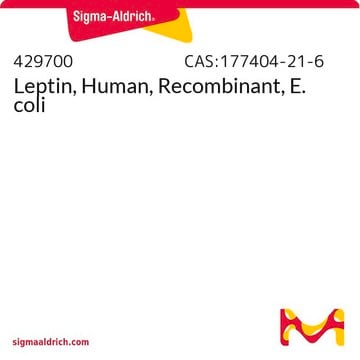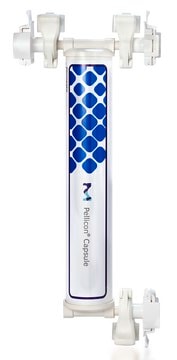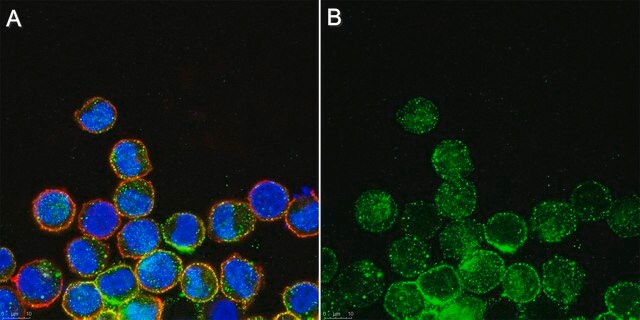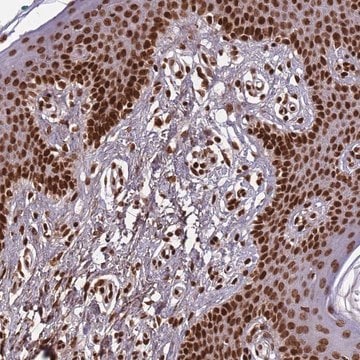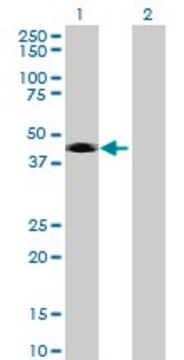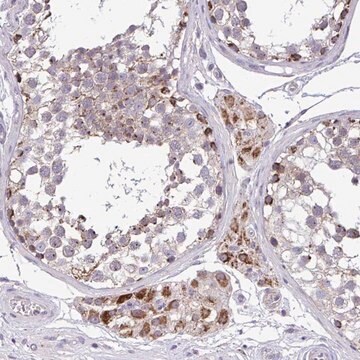MAB8783
Anti-SARS Antibody, S Specific, clone 154C
clone 154C, Chemicon®, from mouse
Sign Into View Organizational & Contract Pricing
All Photos(1)
About This Item
UNSPSC Code:
12352203
eCl@ss:
32160702
NACRES:
NA.41
Recommended Products
biological source
mouse
Quality Level
antibody form
purified immunoglobulin
antibody product type
primary antibodies
clone
154C, monoclonal
species reactivity
human
manufacturer/tradename
Chemicon®
technique(s)
ELISA: suitable
immunofluorescence: suitable
neutralization: suitable
western blot: suitable
shipped in
wet ice
General description
Severe acute respiratory syndrome (SARS) is a viral respiratory illness caused by a coronavirus, called SARS-associated coronavirus (SARS-CoV). Human coronaviruses (HCoVs) were previously only associated with mild diseases. The SARS-CoV genome contains five major open reading frames (ORFs) that encode the replicase polyprotein; the spike (S), envelope (E), and membrane (M) glycoproteins; and the nucleocapsid protein (N). It is an enveloped, positive-sense, single-stranded RNA virus.
Specificity
SARS-associated coronavirus (SARS-CoV) S proteins.
Immunogen
Epitope: S Specific
Application
Anti-SARS Antibody, S Specific, clone 154C is suitable for the detection of SARS in:
Optimal dilutions must be determined by the end user.
Research Category
Infectious Diseases
Research Sub Category
Infectious Diseases - Viral
- Immunofluorescence
- ELISA
- Western Blot
- Immunoblot
- Neutralization
Optimal dilutions must be determined by the end user.
Research Category
Infectious Diseases
Research Sub Category
Infectious Diseases - Viral
Biochem/physiol Actions
Severe acute respiratory syndrome (SARS) -associated coronavirus′ (SARS-CoV) spike glycoprotein mediates the viral entry by binding to the host cell receptor. SARS spike protein is the target for vaccine development and antibody therapies.
Physical form
Format: Purified
Purified immunoglobulin. Liquid in 0.02M PB, 0.25M sodium chloride with 0.1% sodium azide as a preservative
Storage and Stability
Store at 2 to 8°C for up to 12 months from date of receipt.
Other Notes
Concentration: Please refer to the Certificate of Analysis for the lot-specific concentration.
Legal Information
CHEMICON is a registered trademark of Merck KGaA, Darmstadt, Germany
Disclaimer
Unless otherwise stated in our catalog or other company documentation accompanying the product(s), our products are intended for research use only and are not to be used for any other purpose, which includes but is not limited to, unauthorized commercial uses, in vitro diagnostic uses, ex vivo or in vivo therapeutic uses or any type of consumption or application to humans or animals.
Not finding the right product?
Try our Product Selector Tool.
Storage Class Code
10 - Combustible liquids
WGK
WGK 2
Flash Point(F)
Not applicable
Flash Point(C)
Not applicable
Certificates of Analysis (COA)
Search for Certificates of Analysis (COA) by entering the products Lot/Batch Number. Lot and Batch Numbers can be found on a product’s label following the words ‘Lot’ or ‘Batch’.
Already Own This Product?
Find documentation for the products that you have recently purchased in the Document Library.
Customers Also Viewed
The Nucleocapsid Protein of SARS-CoV-2: a Target for Vaccine Development.
Noton K Dutta et al.
Journal of virology, 94(13) (2020-06-18)
Functional assessment of cell entry and receptor usage for SARS-CoV-2 and other lineage B betacoronaviruses.
Letko M, et al.
Nature microbiology, 5(4), 562-569 (2020)
An imperative need for research on the role of environmental factors in transmission of novel coronavirus (COVID-19).
Qu G, et al.
Environmental Science & Technology, 57(7), 3730-3732 (2020)
An Imperative Need for Research on the Role of Environmental Factors in Transmission of Novel Coronavirus (COVID-19).
Guangbo Qu et al.
Environmental science & technology, 54(7), 3730-3732 (2020-03-24)
The nucleocapsid protein of SARS-CoV-2: a target for vaccine development.
Dutta NK, et al.
Journal of virology, 94(13) (2020)
Our team of scientists has experience in all areas of research including Life Science, Material Science, Chemical Synthesis, Chromatography, Analytical and many others.
Contact Technical Service
